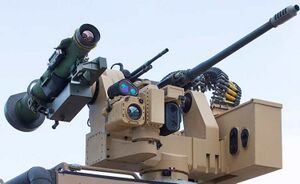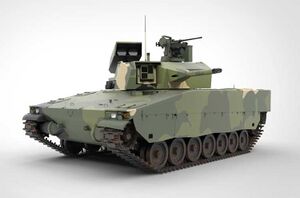FFLS Fjernstyrt Tårn: Difference between revisions
No edit summary |
|||
| Line 62: | Line 62: | ||
To this end, several internal requirements were set. The system had to be lightweight (<200 kg), had to be able to mount at least the 8mm {{wpl|FN MAG|InMg-43}} {{wpl|General-purpose_machine_gun|general purpose machinegun}}, and had to be capable of being operated entirely from within the vehicle the system was mated to. To meet these requirements, a two part system developed consisting of the external remote turret, which contained the sensors and weapon mounts, and the internal control unit which contained a multifunction display screen, analog stick controller, and control switches. The two systems can be connected directly via wire or, on later models, via shortrange radio. | To this end, several internal requirements were set. The system had to be lightweight (<200 kg), had to be able to mount at least the 8mm {{wpl|FN MAG|InMg-43}} {{wpl|General-purpose_machine_gun|general purpose machinegun}}, and had to be capable of being operated entirely from within the vehicle the system was mated to. To meet these requirements, a two part system developed consisting of the external remote turret, which contained the sensors and weapon mounts, and the internal control unit which contained a multifunction display screen, analog stick controller, and control switches. The two systems can be connected directly via wire or, on later models, via shortrange radio. | ||
The first batch of Fjernstyrt Tårn remote turrets were produced in the late 2000s and provided for trials with the Trinovantum military in 2001. The system was accepted for service later that year. | The first batch of Fjernstyrt Tårn remote turrets were produced in the late 2000s and provided for trials with the Trinovantum military in 2001. The system was accepted for service later that year. Initial turrets were only provided with Day/Night optics and basic stabilization. The capabilities of these early systems were considered to be not significantly better than those of manually operated exposed weapon mounts. As such, initial production and deployment was slow. Iterations and improvements over time significantly augmented the capabilities of the Fjernstyrt Tårn system. These included the addition of a laser rangefinder for increased accuracy, a thermal imaging optic for better search and track capabilities, improved weapon mounts that dampened the recoil of mounted systems, and an improved multi-axis stabilizer to assist in firing on the move. | ||
As the capabilities of the Fjernstyrt Tårn system increased, it gained more attention from the Trinovantan military and potential export interests, which in turn accelerated its continued development and production. | |||
== Variants == | == Variants == | ||
Revision as of 19:26, 29 October 2021
This article is incomplete because it is pending further input from participants, or it is a work-in-progress by one author. Please comment on this article's talk page to share your input, comments and questions. Note: To contribute to this article, you may need to seek help from the author(s) of this page. |
| Fjernstyrt Tårn | |
|---|---|
 A Sentinel Heavy RWS with a 30mm autocannon, 8mm coaxial machinegun, and ATGM. | |
| Type | Remote weapon system |
| Place of origin | |
| Production history | |
| Designer | FFLS |
| Designed | 1995-2000 |
| Manufacturer | FFLS |
| Produced | 2001–present |
| Variants | See Variants |
| Specifications | |
| Weight | 60 kilograms (130 lb) to 340 kilograms (750 lb) (Sentinel) 1,250 kilograms (2,760 lb) to 4,000 kilograms (8,800 lb) (Warrior) |
| Crew | 1 |
| Calibre | 8mm, 12.7mm, 15.5mm, 40mm GL, 30mm (Sentinel) 25mm, 40mm (Warrior) |
| Elevation | -20° to 60° (Sentinel Compact, Sentinel) -10° to 60° (Sentinel Heavy) -10° to 50° (Warrior) |
| Traverse | 360° |
| Sights | Day/Night camera Thermal imager Laser rangefinder |
The Fjernstyrt Tårn (Remote Tower) is a family of remote weapons systems (RWS) developed and manufactured by Forente Forsvar Landsystemer of Trinovantum. The first models were adopted for Trinovantan service in 2001 as the FjT-1, and later received the export name “Sentinel.” In 2010, FFLS developed a new series of enclosed, modular unmanned turrets that could potentially be fitted to heavier vehicles. These remote turrets were given the export name “Warrior” to differentiate them from the lighter “Sentinel” RWS series, though they are considered part of the same product family.
Development
In the 1990s, Forente Forsvar Landsystemer of Trinovantum began development of a system to augment the firepower of light vehicles and the survivability of their operators. Key lessons learned from analysis of the Omandan Continental War and the simultaneous war with Ostlichtor had shown that light utility and transport vehicles were often at higher risk than previously anticipated. Often vehicles in this class were unarmed, and those that were armed commonly used exposed weapon mounts that put the operator at elevated risk during their use. In order to address this issue, Forente Forsvar Landsystemer began the private development of the Fjernstyrt Tårn remote weapon system. The assessment of FFLS determined that the firepower provided by exposed weapon systems was often sufficient for the class vehicles they were provided to. The unacceptable risk came from the exposure of an operator or operators of these weapons to incoming fire. As such, the intention was not necessarily to increase the level of firepower afforded to these vehicles, but to increase the safety of the operators of these weapons.
To this end, several internal requirements were set. The system had to be lightweight (<200 kg), had to be able to mount at least the 8mm InMg-43 general purpose machinegun, and had to be capable of being operated entirely from within the vehicle the system was mated to. To meet these requirements, a two part system developed consisting of the external remote turret, which contained the sensors and weapon mounts, and the internal control unit which contained a multifunction display screen, analog stick controller, and control switches. The two systems can be connected directly via wire or, on later models, via shortrange radio.
The first batch of Fjernstyrt Tårn remote turrets were produced in the late 2000s and provided for trials with the Trinovantum military in 2001. The system was accepted for service later that year. Initial turrets were only provided with Day/Night optics and basic stabilization. The capabilities of these early systems were considered to be not significantly better than those of manually operated exposed weapon mounts. As such, initial production and deployment was slow. Iterations and improvements over time significantly augmented the capabilities of the Fjernstyrt Tårn system. These included the addition of a laser rangefinder for increased accuracy, a thermal imaging optic for better search and track capabilities, improved weapon mounts that dampened the recoil of mounted systems, and an improved multi-axis stabilizer to assist in firing on the move.
As the capabilities of the Fjernstyrt Tårn system increased, it gained more attention from the Trinovantan military and potential export interests, which in turn accelerated its continued development and production.
Variants
Sentinel
The Sentinel series RWS is intended for use as the primary weapon system for light vehicles or as a secondary weapon system for armored combat vehicles. Three variants are available, each with different weights and suitable for different arrays of weapons. All variants are similar in that they are exposed, unarmored platforms for the weapons they carry. Presuming a proper mounting, all sentinel variants are capable of rotating a full 360 degrees and elevating up to 60 degrees. The Sentinel and Sentinel Compact are capable of a complete rotation in approximately 4 seconds. The Sentinel Heavy completes a full rotation in 5 seconds.
- Sentinel Compact - 60 kg weight without armament. Can mount up to 12.7mm heavy machineguns. Intended for use on unarmored vehicles and unmanned ground vehicles.
- Sentinel - 135 kg weight without armament. Can mount up to 15.5mm heavy machineguns or man portable missiles. Intended for use on light vehicles, or as a secondary weapon for armored vehicles.
- Sentinel Heavy - 340 kg weight without armament. Can mount up to 30mm light autocannons, with secondary mounts for missiles and an 8mm coaxial machinegun. Intended for use on lightly armored combat vehicles, or as a secondary armament for armored vehicles.
Warrior
The Warrior series of unmanned turrets are intended to be a complete weapons package that is intended for use on armored fighting vehicles. Unlike the Sentinel series of RWS, these turrets are fully enclosed and armored to protect the systems they carry. Like the Sentinel series, the Warrior series comes in three distinct variants that differ primarily in weight. All Warrior unmanned turrets are compatible with the Sentinel RWS. All Warrior turrets are capable of rotating a full 360 degrees and elevating up to 50 degrees.
- Warrior Compact - 1250 kg weight. Mounts a KjMkVa-23 25mm chain gun and an 8mm coaxial machinegun. The Turret contains enough space for 2 belts of 85 rounds for the chain gun, and 200 rounds for the coax. Armor is capable of resisting up to 8mm armor piercing ammunition. Incompatible with the Sentinel Heavy RWS.
- Warrior - 2450 kg weight. Mounts a KjMkVa-23 25mm chain gun and an 8mm coaxial machinegun. The Turret contains enough space for 2 belts of 85 rounds for the chain gun, and 400 rounds for the coax. Armor is capable of resisting up to 12.7mm armor piercing ammunition.
- Warrior Heavy - 4000 kg weight. Mounts a KjMkVa-31 40mm autocannon and an 8mm coaxial machinegun. A pop-up armored box launcher capable of holding two Lumenic PAS-15 ATGMs is present at the rear of the turret. The Turret contains enough space for 2 belts of 55 rounds for the autocannon, and 400 rounds for the coax. Armor is capable of resisting up to 20mm APFSDS ammunition.
Operators
Sentinel
 Trinovantum - Operates all three variants as the FjT-1 (Sentinel), FjT-2 (Sentinel Heavy), and FjT-3 (Sentinel Compact)
Trinovantum - Operates all three variants as the FjT-1 (Sentinel), FjT-2 (Sentinel Heavy), and FjT-3 (Sentinel Compact)
Warrior
 Trinovantum - Operates the Warrior Compact as the FjT-4
Trinovantum - Operates the Warrior Compact as the FjT-4


